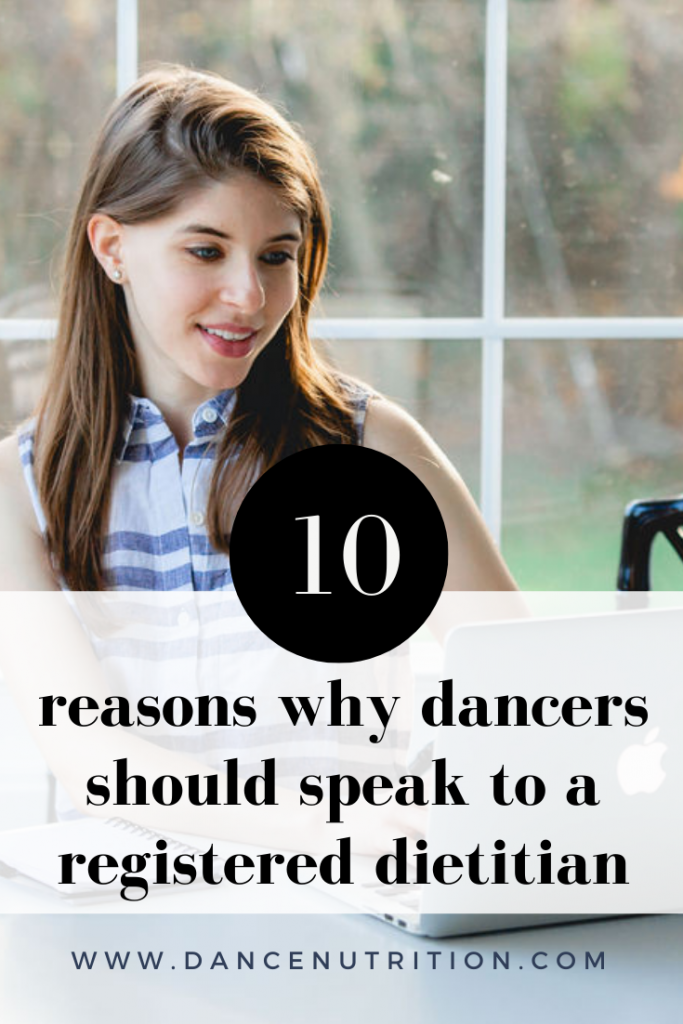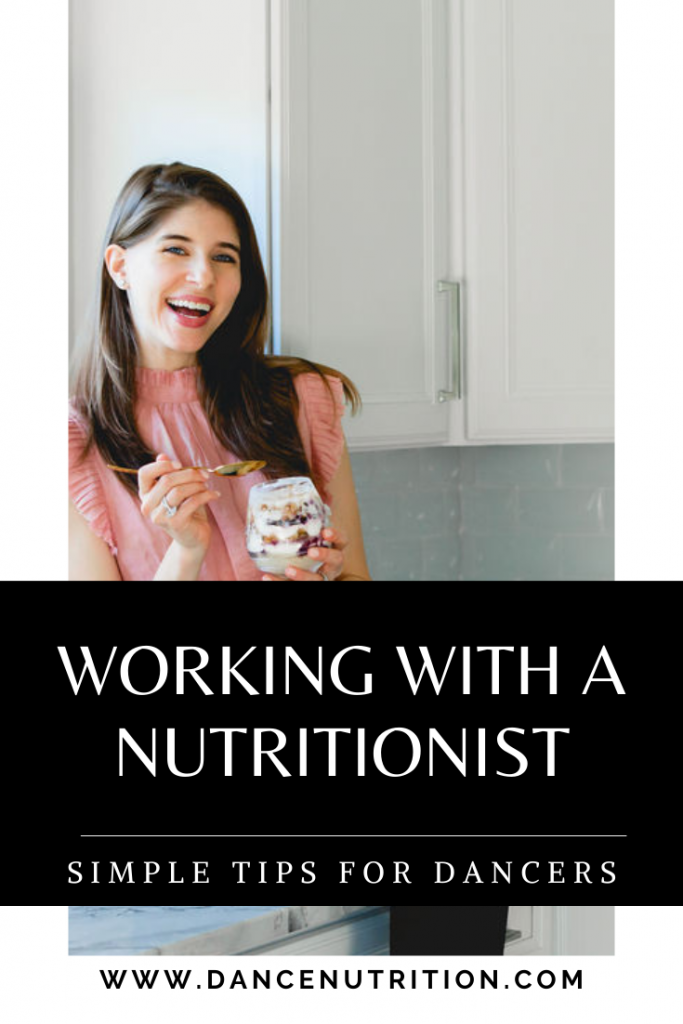For dancers, food and nutrition advice— meal planning, macronutrient analysis, nutrition assessment, and performance optimization— should be performed by a Registered Dietitian Nutritionist. However, information floods our media feeds and makes it hard to decipher the truth from trends.
Dancers are not just artists, they’re also athletes— trusting credentialed practitioners to provide interventions that support a dancer’s goals is critical. This article dives into why dancers should consult with a Registered Dietitian Nutritionist for nutrition coaching, including what to look for when choosing a practitioner.
Why A Licensed Dietitian Nutritionist?
Similar to their training, dancers deserve a quality of care that supports career longevity. Licensed nutrition experts help dancers fine-tune meals and snacks for performance and recovery. They can provide detailed guidance on how to fuel before class, during rehearsals, and for competitions or performances. However, it’s not easy to identify qualified nutrition advice. Since titles like “nutrition expert” and “nutritionist” are not regulated, anyone can use them. Let’s uncover what separates a licensed practitioner from those lacking the credentials.
#1: Extensive Training
Registered Dietitian Nutritionists receive years of clinical training in medical nutrition therapy and nutrition research— 7 years is the norm. Academic education in clinical nutrition, sports nutrition, life cycle nutrition, counseling, and more. Medical Nutrition Therapy is the root of food and nutrition interventions, particularly for populations with advanced needs like injury recovery, post-op surgery, and gastrointestinal disturbances to name a few.
To become a Registered Dietitian Nutritionist, individuals must attain a Master’s degree. This further sets RD’s apart from other non-credentialed nutrition enthusiasts. Here’s an article that discusses the path toward dietetics licensure.
#2: Continuing Education
Dietitians are required to complete continuing education throughout their professional practice. Since nutrition is an evolving science, continuing education ensures dietitians remain up-to-date on nutrition research. It also allows dietitians to advance their practice in areas like Sports Nutrition, Intuitive Eating, and Eating Disorders. This training sets dietitians apart from other nutrition professionals like health coaches.
#3: Research Proficiency
As part of licensure, dietitians must exemplify proficiency in nutrition research. Dietitians are always turning to published research for evidence-based approaches to nutrition. This unique background enables dietitians to analyze qualitative research outcomes and accurately translate scientific jargon into accessible information. Here’s an article to expand your knowledge in nutrition research.
I already know how to eat healthfully…
Dancers are especially vulnerable to the development of disordered eating and eating disorders (three times more likely!). Individuals and coaches who identify as nutrition experts but don’t hold appropriate credentials can easily share triggering content with those most vulnerable.
A dancer’s nutritional needs are also comparable to those of an athlete. I’ve previously discussed the important role of a registered dietitian nutritionist for dancers. Thorough academic and clinical training is the backbone of nutrition education— especially for dancer health and wellness. Dancers must seek qualified advice for interventions that involve any of the following:
- Performance Nutrition
- Injury prevention
- Eating disorder recovery
- Disordered eating prevention
- Disease management
When is the right time for a dancer to consult with a dietitian nutritionist?
It’s never too late to build a connection between your relationship with food and your dance performance. I work with dancers throughout the life cycle— from as young as 9 to retired dancers in their late 60s. If you’re unsure about whether a dietitian can support you, consider the following:
#1: You’re ready to optimize your performance
Dietitians offer goal-oriented approaches to educate you on the specific foods and habits needed to level up your training. If your stamina or strength is not where you want it to be, despite consistent training, it may be worth evaluating your meal plan. Whether striving to improve your energy, sharpen your mental clarity, reduce your risk for injury, or improve your relationship with food and body, working with an RD can help you achieve these goals.
#2: You’re looking for confidence in your food choices
Dancers benefit from convenience, mealtime balance, food flexibility, and variety. Speaking with a Registered Dietitian Nutritionist who understands the mechanics of hormonal balance, digestion, and metabolism allows dancers to make more educated choices that will fuel their bodies and lead to greater success both in and out of the studio.
#3: Your relationship with food feels strained
Dancer diet culture normalizes disordered eating behaviors. Whether you’re avoiding one specific food group, striving for “clean eating,” or eliminating whole macronutrients (such as carbs) you may be headed down a road of unsustainable eating habits. Dancers can seek a dietitian with additional certification as a Counselor of Intuitive Eating to learn more about the benefits of rejecting the diet mentality and building a sustainable non-restrictive approach to eating.
#4: You’re unsure about foods that are “good” and “bad”
From “All Natural” and “Organic” to “Dairy-Free,” “Clean,” and “Gluten-Free,” an endless array of options depict a confusing story. Speak with a Registered Dietitian Nutritionist to sift through the data and decipher options that support your physical, mental, emotional, and spiritual well-being.
#5: You’re feeling unwell after meals, physically and mentally
Food should be an enjoyable experience. From stomach discomfort to preconceived guilt or that “I shouldn’t be eating this” mindset, a Registered Dietitian Nutritionist can help you heal your mind-body connection. We’ll work together to construct a whole-body approach that supports sustainable performance and lifestyle goals.
#6: You’re going through life transition
Going through puberty, a busy performance season, the start of college, or recovering postpartum can all impact your nutritional needs. A dietitian ensures your body receives what it needs at each life phase, adapting recommendations to your unique physiology and goals.
#7: You’re confused about meal planning
Busy schedules and below-average pay rates make it tough for dancers to prioritize their food choices throughout a hectic day. From convenient snacks to menu ordering, Registered Dietitian Nutritionists teach you how to navigate busy times, tight budgets, and on-the-go routines.
How can dancers get started with a Registered Dietitian Nutritionist?
Virtual nutrition coaching and HIPPA-compliant telehealth make it easy to receive qualified nutrition services for even the busiest of dancers. While some may question the virtual approach, the accessibility and convenience of telehealth allow dancers to work with board-certified nutrition professionals despite an over-booked schedule. If you prefer an in-person experience over virtual work, The Academy of Nutrition and Dietetics provides tools to help dancers find a dietitian in their area. Click here to learn more about my role as a registered dietitian nutritionist for dancers.
Is it a good fit for me?
While the title of dietitian can help to filter much of the mess surrounding nutrition education, licensure alone doesn’t necessarily translate to nutrition advice that is safe for consumption (a topic I dive into here). Additional credentials, such as specialties in eating disorders (CEDS) and certification in Intuitive Eating are beneficial for dancers who suspect that they’re struggling with disordered eating or who have been diagnosed with an eating disorder. A Certified Specialist in Sports Dietetics can also be helpful for dancers needing to support active training routines and performance schedules
A Team Approach
An interdisciplinary approach is a technique used to coordinate care between various health practitioners— resulting in a more thorough, personalized, and tailored approach to a dancer’s needs and goals. Registered dietitians, mental health practitioners, medical doctors, fitness trainers, and dance educators can work together to support a dancer’s career tremendously. Health coaches and other wellness enthusiasts can be useful in offering career support, mentorship, and acting as an overall cheerleader for a dancer. In some cases, an endocrinologist or gastroenterologist may be referred.
The Bottom Line
Unless one holds licensure as a dietitian, it is outside of their scope of practice to prescribe nutrition plans, offer nutrition interventions, or conduct nutrition-focused assessments. A registered dietitian (RD) or RDN has completed rigorous education, internships, and exams to provide scientifically backed advice. In addition to this, many specialize in sports nutrition or eating disorders, both crucial for dancers.
I’m reassured working with a dietitian. I saw Rachel’s name in an article for Dance Magazine and felt compelled to connect. Rachel’s personal background as a dancer makes our work together relatable and enjoyable. For dancers, it’s not easy finding a medical professional who just gets it. I now have insight into my body and its needs as a dancer. I feel stronger in class and more confident on stage.
Ashley, dancer with New York City Ballet




